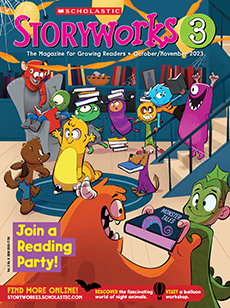ART BY JOHN CORBITT. NIKOLAEVA/SHUTTERSTOCK.COM (BACKGROUND); VORONINA SVETLANA/SHUTTTERSTOCK.COM ($20 BILL)
Can you believe we found $20 on the sidewalk? We’re so lucky! We should definitely keep it. We found the money, so it’s ours. It’s not like we’re stealing $20 out of someone’s wallet.
Of course, we would return it if we knew who dropped it. But we have no idea who this money belongs to. Besides, how would we find the right person? We can’t just put up signs around the neighborhood saying “Found, $20.” Anybody could lie and say it was theirs.
Plus, no one is going to judge us. In fact, plenty of people in our position would keep the money. According to a 2017 Scholastic survey of 376 middle schoolers, nearly half said they would keep money they found on the ground. Are all of those kids bad people? No!
Here’s an idea. We won’t even use the money for ourselves. We’ll use the money to buy presents for our parents or our teacher. So, what do you say?
Your friend,
Jack
Can you believe we found $20 on the sidewalk? We’re so lucky! We should definitely keep it. We found the money. That makes it ours. It’s not like we’re stealing it out of someone’s wallet.
Of course I would like to return it. But we don’t know who dropped it. We have no idea who this money belongs to. Besides, how would we find the right person? We can’t just put up signs around the neighborhood saying “Found, $20.” Anybody could lie and say the money is theirs.
Plus, no one is going to judge us. Plenty of people would keep the money. I found a Scholastic survey of 376 middle schoolers from 2017. Nearly half said they would keep money they found on the ground. Are all of those kids bad people? No!
Here’s an idea. We won’t even use the money for ourselves. We’ll use the money to buy presents for our parents or our teacher. So, what do you say?
Your friend,
Jack

